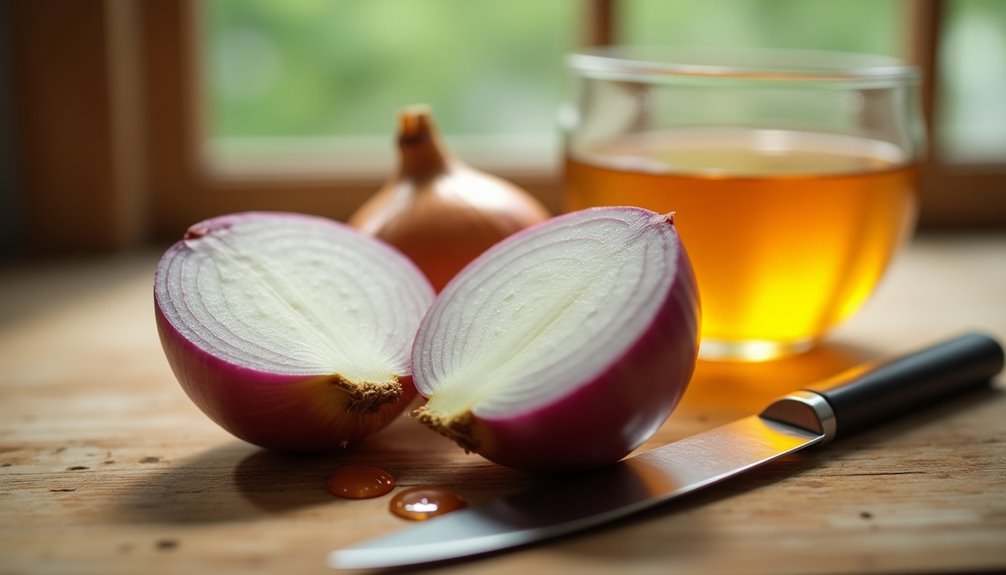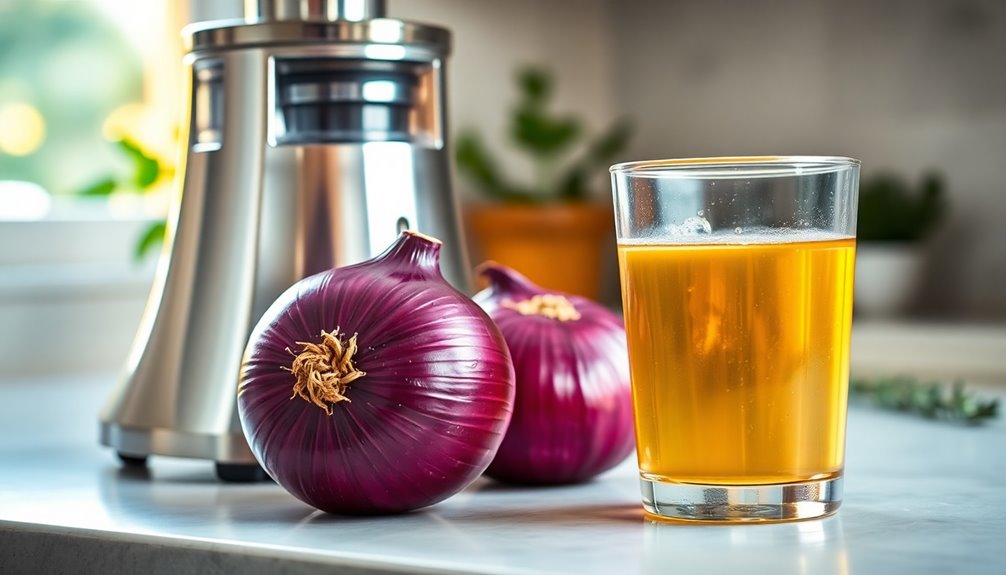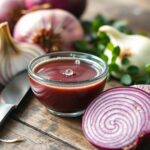To make onion juice for cough relief, peel and chop 1-2 onions into small pieces. Use a juicer or a blender (adding a little water if using a blender) to extract the juice. Strain the mixture through a fine sieve or cheesecloth. You can store the juice in an airtight container in the fridge for up to a week. For added flavor and benefits, consider mixing it with honey or lemon juice. There's more to discover about enhancing your remedy!
Key Takeaways
- Peel and chop 1-2 onions into small pieces, then use a juicer or blender to extract the juice.
- If using a blender, add a little water to help with the blending process.
- Strain the mixture through a fine sieve or cheesecloth to obtain clear onion juice.
- For enhanced flavor and benefits, mix the juice with honey and optional lemon juice.
- Store the juice in a clean, airtight container in the refrigerator for up to a week.

Onion juice is a simple yet effective remedy for cough relief that you can easily make at home. This homemade cough remedy harnesses the natural health benefits of onions, which are known for their antibacterial properties and ability to support the immune system. By incorporating a few additional ingredients, you can create a soothing mixture that helps alleviate cough symptoms and promotes respiratory health.
To start, gather 1-2 onions. Peel them and chop them into small pieces. The smaller the pieces, the easier it'll be to extract the juice. When you chop the onion, you also release its natural juices, which contain the compounds that make it an effective remedy for cough relief.
Once you've chopped the onions, you can use a juicer or a blender to puree the pieces into a smooth mixture. If you're using a blender, it's a good idea to add a little water to help the process along.
After you've blended the onions, it's time to strain the syrup. Place a fine sieve or a piece of cheesecloth over a bowl and pour the onion puree into it. Use a spoon to press down on the mixture, helping to extract as much juice as possible while leaving the pulp behind. The resulting liquid is your homemade onion juice, ready for use.
It's a good idea to store the extracted onion juice in a clean, airtight container in the refrigerator. This way, you can keep it fresh for up to a week, making it convenient to use regularly.
To enhance the flavor and effectiveness of your onion juice, consider mixing it with honey. Honey not only adds sweetness but also has its own health benefits, such as soothing sore throats and acting as a natural cough suppressant. You can mix 1-2 teaspoons of honey into your onion juice before consuming it.
For an extra boost, you might want to add a splash of lemon juice, which can brighten the flavor and provide additional vitamin C to support your immune system.
When you're ready to use the onion juice, simply take 1-2 teaspoons of the mixture as needed. You'll find that this simple remedy can help alleviate your cough and make you feel more comfortable. The combination of chopped onions, honey, and lemon juice creates a powerful elixir that works effectively against cough symptoms.
Incorporating onion juice into your routine is a great way to use natural ingredients for health benefits. The next time you feel a cough coming on, remember this easy recipe. You can create your homemade remedy, enjoy the soothing properties, and support your immune system, all from the comfort of your kitchen.
Frequently Asked Questions
How Do You Use Onion Juice for a Cough?
To use onion juice for a cough, you'll want to start by finely chopping a large onion and letting it sit for about 10-15 minutes. This helps release its juices.
After that, strain the mixture to get the liquid. Mix this onion juice with honey to improve its taste and soothing properties.
Take 1-2 teaspoons of this mixture several times a day to help relieve your cough symptoms effectively.
Always check with a healthcare professional first.
Does Raw Onion Stop Coughing?
You might wonder if raw onion actually stops coughing. While there's no guaranteed cure, raw onion's natural compounds like quercetin can help reduce inflammation and soothe your airways.
Its strong aroma stimulates mucus production, helping clear phlegm. Many people find that consuming raw onion provides relief from cough symptoms, thanks to its expectorant properties.
However, individual responses vary, so if your cough persists, it's best to consult a healthcare professional.
How to Make Onion Juice for Lungs?
To make onion juice for your lungs, start by finely chopping a large onion.
Use a juicer or a sieve to extract the juice, collecting it in a clean container.
For added benefits, let the juice sit for a short while to boost its potency.
You can mix it with honey for a soothing effect.
Aim for 1-2 teaspoons daily, especially during cold and flu seasons, to support your respiratory health effectively.
How to Prepare Onion Juice for Drinking?
To prepare perfect onion juice, peel and chop a large onion into smaller pieces.
Blend or juice those bits to extract the flavorful liquid, then strain it through a fine sieve for a silky-smooth finish.
If you want, you can sweeten it with honey or brighten it up with lemon juice.
Store any surplus in a sealed glass container in the fridge, ensuring it's used within a week for optimum freshness.
Enjoy!
Conclusion
You've discovered a simple, natural remedy for your cough—onion juice. As you sip this pungent concoction, remember that sometimes the most unassuming ingredients can hold the key to relief. Isn't it amazing how nature provides us with solutions right in our kitchens? So, the next time you feel that tickle in your throat, don't overlook the power of onions. Embrace this healing gift, and let your body embark on the journey to wellness.
Cindy thoroughly researches juicing trends, techniques, and recipes to provide readers with practical advice and inspiration. Her writing style is accessible, engaging, and designed to make complex concepts easy to understand. Cindy’s dedication to promoting the advantages of juicing shines through her work, empowering readers to make positive changes in their lives through the simple act of juicing.

















